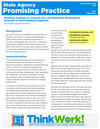Delphi Panel Findings #3: Collaboration Across Agencies
This is the third in a series of briefs on the findings from a Delphi process conducted by the Employment Learning Community in 2013–2014. More information on the Employment Learning Community and the Delphi process can be found in Brief #1 (Introduction, Values, and Overall Themes). This brief focuses on the panel’s recommendations related to collaboration across state systems, which was the second-highest overarching priority identified by the Delphi panel for improving employment outcomes for people with intellectual and developmental disabilities (IDD).
